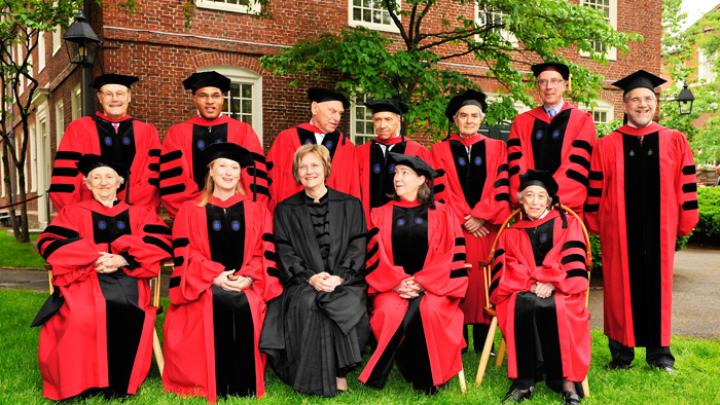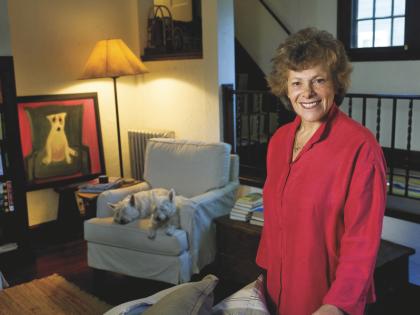At the morning exercises of its 359th Commencement on May 27, Harvard conferred honorary degrees on six men and four women; a majority had earned Harvard degrees earlier in life. They are listed here in alphabetical order, except for the tenth recipient, who will also be the guest speaker at the afternoon exercises. Below are brief biographies. Their honorary-degree citations follow the biographical entries.
Thomas R. Cech, Doctor of Science. A chemistry graduate of Grinnell College who earned his Ph.D. in chemistry from the University of California, Berkeley, Cech joined the University of Colorado, Boulder, faculty in 1978. He subsequently became a Howard Hughes Medical Institute investigator. His research group demonstrated that RNA had an active role in cellular metabolism, catalyzing reactions without any role for proteins—work for which he shared the Nobel Prize in Chemistry in 1989. From 2000 through 2009, he served as president of the Howard Hughes Medical Institute; during his tenure, HHMI built a pioneering research laboratory at Janelia Farm, an inspiration for recent Harvard laboratories. He subsequently returned to the University of Colorado. In January 2007, Cech told the Harvard Crimson, in a telephone interview, that he had been under consideration for the Harvard University presidency, but withdrew his name in light of his scientific commitments.
Boulder's boldest investigator,
Hughes's generative guide,
a master biochemist whose discovery of ribozymes
has deepened our appreciation for the splice of life.
Renée C. Fox, Ph.D. ’54, Doctor of Laws. The Annenberg professor emerita of the social sciences at the University of Pennsylvania, Fox has been a leader in the sociology of medicine, medical research, medical education, and medical ethics. Her books include Experiment Perilous: Physicians and Patients Facing the Unknown, The Courage to Fail: A Social View of Organ Transplants and Dialysis, and Spare Parts: Organ Replacement in American Society (the latter two written with Judith P. Swazey). Fox has taught at Barnard College, Harvard, and Penn. She holds the Radcliffe Graduate School Medal and a Centennial Medal from Harvard’s Graduate School of Arts and Sciences, and many honorary degrees and other awards for professional achievement.
Exemplary expositor of medicine's moral conundrums,
she reveals the pulsating realtiy of human relations
in the quest of physicians to do good and no harm.
Freeman A. Hrabowski III, Doctor of Laws. As president of the University of Maryland, Baltimore County, since 1992, Hrabowski has been recognized for enabling high-achieving students of all backgrounds—particularly underrepresented minorities—to earn advanced degrees and research careers in science and engineering. He is coauthor of Beating the Odds: Raising Academically Successful African American Males and Overcoming the Odds: Raising Academically Successful African American Young Women, both focusing on scientific achievement.
Galvanic force in his university's ascent,
spurring success against the odds,
a leader whose wellspring of energy and insight
has plenished pools of talent in science and beyond.
Susan Lindquist, Ph.D. ’77, Doctor of Science. A member and former director of the Whitehead Institute for Biomedical Research (which she led as its genome center was transformed into the Broad Institute), Lindquist, a Howard Hughes Medical Institute Investigator, is professor of biology at MIT. A leading researcher on protein folding, she has helped open new ways of understanding complex protein-folding disorders, such as Parkinson’s and Huntington’s diseases. Read about her research as a Radcliffe Institute fellow, and about her previous recognition as a Graduate School of Arts and Sciences Centennial Medalist.
Ingenious in illumining molecular marvels,
intent on alleviating degenerative diseases,
she unfolds nature's secrets by unveiling the origami of life.
Thomas Nagel, Ph.D. ’63, Doctor of Laws. Nagel is University Professor, professor of law, and professor of philosophy at New York University. He is widely published in political philosophy, ethics, and philosophy of mind. His books include The Possibility of Altruism, Mortal Questions, What Does It All Mean? and Equality and Partiality.
Ranging wide across realms of philosophy,
delving deep into consciousness and ethics,
a perspicacious reader of other minds
who helps us understand what we may never understand.
David G. Nathan ’51, M.D.’55, Doctor of Science. A hematologist and oncologist, the Stranahan Distinguished Professor of pediatrics and professor of medicine at Harvard Medical School served as physician-in-chief at Children’s Hospital, and from 1995 to 2000 as president of Dana-Farber Cancer Institute, both in Boston. He described his research on thalassemia in the book Genes, Blood and Courage. His account of breakthroughs in oncology, titled The Cancer Treatment Revolution, was excerpted as “Ken’s Story” in Harvard Magazine; more recently, he wrote about the “unexpected life” of a thalassemia patient for whom he has cared for more than four decades. Nathan is a recipient of the National Medal of Science.
Wise in the ways of blood,
compassionate in the care of children,
savvy in the guidance of individuals and institutions,
devoted to preserving the finest traditions of his calling.
Onora S. O’Neill, CBE, FBE Hon FRS, Ph.D. ’69, Doctor of Laws. Onora O’Neill was educated at Oxford and Harvard, where she studied with John Rawls, author of A Theory of Justice. She was Principal of Newnham College, Cambridge, from 1992 to 2006, and has been a member of the House of Lords since 1999. An ethicist and political philosopher, she has written about international justice, Immanuel Kant, and bioethics, among other subjects. Her works include Faces of Hunger: An Essay on Poverty, Development and Justice, Towards Justice and Virtue, and Autonomy and Trust in Bioethics.
Adroit in the public use of reason,
acute in thinking beyond borders,
she deftly expounds the bounds of justice
and casts fresh light on the question of trust.
Richard Serra, Doctor of Arts. As he attended the University of California at Berkeley and Santa Barbara, Serra, the son of a shipyard pipefitter, worked in steel mills to support himself. After earning B.F.A. and M.F.A. degrees at Yale, where he trained as a painter, he began making sculptures out of fiberglass and other materials, beginning in the mid 1960s. He has since become best known for monumental steel sculptures. Serra’s Torqued Ellipses were exhibited at Dia Center for the Arts, and “Richard Serra, Sculpture: Forty Years,” was featured at the Museum of Modern Art in 2007. (Serra’s work appeared in Harvard Magazine’s 1999 cover story on Storm King Art Center, established by H. Peter Stern ’50; the center celebrates its fiftieth anniversary this summer.)
A formidable man of steel
whose sublime creations unsettle and allure,
he has knocked sculpture off its pedestal
and forged a new interplay of viewer and viewed.
Meryl Streep, Doctor of Arts. A graduate of Vassar College, Streep received her M.F.A. from Yale in 1975, and began her career on the stage in New York. For 35 years, she has been active in an astonishing variety of acclaimed roles, particularly in movies; she has become the most nominated performer in the history of both the Academy Awards and the Golden Globes. Her recent film credits have included It’s Complicated and Julie & Julia. (The 2009 Harvard Magazine profile of playwright Christopher Durang ’71 recounts his overlapping Yale theatrical studies with Streep.)
From Sophie to Silkwood, Miss Julie to Julia Child,
an actress of luminous intensity and infinite variety
whose transcendent performances richly merit this academy's award.
The Honorable David H. Souter ’61, LL.B. ’66, Doctor of Laws. The retired associate justice of the U.S. Supreme Court attended Harvard College, was a Rhodes Scholar at Magdalen College, Oxford, and earned his law degree at Harvard Law School. After a brief period of private practice, he served in the New Hampshire Attorney General’s office in various capacities, becoming Attorney General himself in 1976. Two years later, he was appointed to that state’s Superior Court, and then, in 1983, to the New Hampshire Supreme Court as an associate justice. He became a judge of the U.S. Court of Appeals for the First Circuit in May 1990 and was subsequently nominated to the U.S. Supreme Court by President George H.W. Bush. Justice Souter served from October 1990 through June 2009.
Even-handed, even-tempered, ever attentive to the facts of the case,
a model of modesty and moderation in society's service,
whose independent spirit and intellectual rigor
have balanced the scales of justice.









